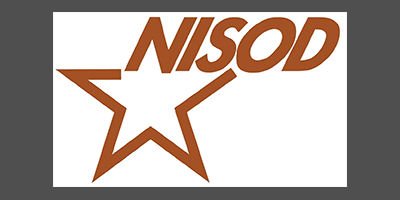NISOD 2018 - International Conference on Teaching and Leadership Excellence
May 26, 2018 to May 29, 2018 in Austin, TX.
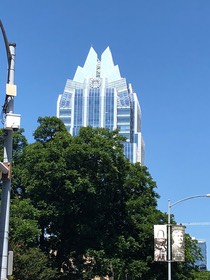
Day 1 Excursions
Upon arrival I signed up for two excusions that were put on by NISOD.
Lyndon B Johnson Presidential Library
This was an excellent experience. Anyone interested in civil rights, pell grants, National Parks, Head Star, TRiO, the War on Poverty, Medicaid and Medicare, and all the other types of legislation that came out of this era would love to visit this museum/library.
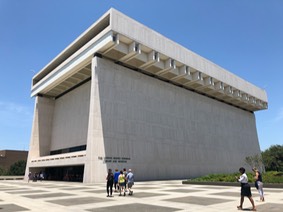
San Antonio, TX
The next trip was to San Antonio (including the Alamo). Much fun was had by all. The Alamo was cool but the riverfront district was the rage!
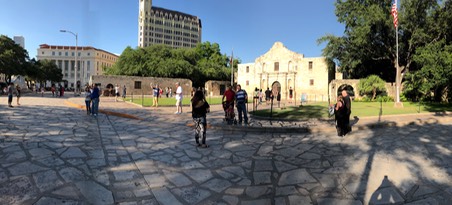
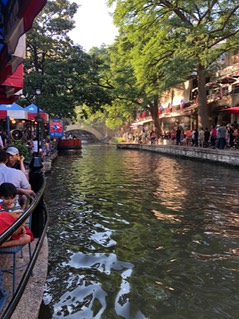
I WON!
On the first day of the confrenence there was an opportunity to post a selfie to the #NISOD2018 on Twitter. People who did so would be randomly selected for prizes.
I won a coupon that pays for next year's NISOD conference fee!
First-Timers Orientation
First-time attendees at the confrence were urged to particiapte in a special seminar. This seminar introduced us to the NISOD organization and general expectations and structure of the conference.
According to their website, NISOD is "a membership organization committed to promoting and celebrating excellence in teaching, learning, and leadership at community and technical colleges."
(Click on the logo to visit their website)
Check out the membership benefits (including conferences, awards, trainings, webinars, regional offerings, etc.) KVCC may well want to become a member of this organization!
Teaching with your Mouth Shut: Keeping Studnets Active, Attentive, and Engaged
This sesson was led by the dynamic Ericka Landry, Faculty Director, Lone Star College System

Session Description
"We all are teachers, we all are learners." This session is titled after a book by Donald Finkel, "Teaching with your Mouth Shut". The focus is on why teachers should talk less so studnets are more engaged and learn more. Participants expereince the session as studnets and share feedback during and after th activities. Particpants leave with at least five new engagement strategies they can immediately apply in their classrooms."
Mark's Notes:
Suggests using the app called "Padlet"...an app for posting comments and questions live in the classroom.
Activity #1 - Showed pictures in nature. Had us come up with how to explain something related to our expertise using the picture. She used a lot of nature pictures for this. The group came up with a lot of analogies and such that were very creative.
Activity #2 - Let your textbook do the talking! Suggests that we rely on our textbooks to do the detail talking about specific information. It will be important to do the following:
- Select the right textbook (she suggests using OEM and specifically outlined the use of OpenStax.
- Creating critical open-ended questions from the text.
- Pulling quotes and graphics from the text to use in class.
- Making connections to text, going deeper.
- 2-minute reflections - what was learned before class (reading) and what was learned after class.
Activity #3 - Groups need to be structured. Groups will work in a classroom as long as you have good instructions and roles.
- Team Captains
- Time Keeper / Summarizer
- Delegator
- Artists / Reader / Clarifier / etc. (these roles depend on the goals of the group.)
Make sure group is "intentional".
To practice this we were given bags with objects in them and had to come up with a topic lesson using the object. This was actually very powerful.
Activity #4 - Closing your Lessons
Make sure that you plan to close your lessons. Here are some suggested activities to close your session:
- Exit slips (hand it in or post on a board while leaving)
- One sentence summaries
- Group debrief
- Lesson ties to the next lesson
- Surveys (use the technology)
- Identify the muddiest point
Service-Learning and Internships in the Natural Sciences: Implementation, Successes, and Challenges
This sesson was led by Jennifer Smith, Professor, New Mexico State University - Alamogordo
Session Description
"Many students are first-genration college studnts who have not been exposed to the benefits of education, including how it can lead to enjoyable, meaningful careers. This sesson shares how New Mexico State University - Alamogordo developed a Wildlife and Fisheries course in which students experience service-learning projects and receive internships. Recommended methods to ensure that student-learning objectives are met through experiential learning are covered, as is the supporting research."
Mark's Notes
I actually met Dr. Smith in the previous session and through our conversation, she invited me to co-present with her on the topic of Service-Learning. Her program is grant funded and provides funds to pay students to engage with researchers in conservation and wildlife research as part of her class. She is the only person to do Service-Learning on the campus.
My contribution was to discuss the devleopment of a culture of Service-Learning on a reluctant campus, how to build upon individual faculty passion, and the resources available through Campus Compact.
This roundtable presentation was also attended by another "Director of Service-Learning" so the discussion was rich and anecdotal.
Good Wholesome Fun with Librarians: Situating the Library at the Center of Faculty Development
This sesson was led by Jennifer Kelley, Reference Librarian / Coordinator, College of DuPage
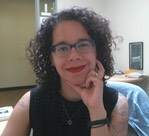
Session Description
"On many campuses, faculty professional development coordinators and librarians share similar responsibilities - providing access to resources, facilitating learning, and supporting the pursuit of knowledge. What avenues open for faculty members when the faculty professional development coordinator is a librarian. View facuty development through the lens of critical library pedagogy, discuss how 21st century literacies can inform practice, and identify opportunities for collaboration between academic libraries and teaching and learning centers during this lively and interactive session."
Mark's Notes
At College of DuPage the roles of Faculty Development are housed in the Library. Work with faculty on critical questions/issues such as:
- Why do we ask students to use peer reviewed articles?
- How do we conceptualize valuations resources?
- Workshops on the Future of Research
- Classroom Strategies
- Critical Pedagogy
- Special Collections in the Library
- Health and Wellness Workshops (Stress, How to talk to a Doctor, Insurance, etc.)
- "Beer with the Librarians" event every week! - topics include citations, satire, critical thinking, etc.
- Landscape of Practice (shared with Faculty) - we have our specialties, our interactions with others in the community, personal experiences, technology, language, jargon, etc.
- Continually cross over boundaries between Librarians and Faculty
- Academic Transformation
- Accessibility and Universal Design for Learning
- Privacy and Security
- Digital Information Literacies
- Instructional Design
- Online Learning & Teaching
- Retention
Promoted the Library as a CENTER of student and college identity. They even give out the ID cards to focus on this role.
Great session on the match between the critical skills that librarians possess and the needs for Faculty Development.
The Effectiveness of High-Impact Practices on Student Success and Retention
This sesson was led by Jessica Carroll, Instructor, Community College of Baltimore County
Session Description
"This session addresses the concept and research that support using High-Impact Practices (HIP) to assist students to become successful learners. We start by discussing what HIPs are, followed by sharing research that supports these activities. We then discuss how HIPs help students and the college. We finish with a discussion about the HIPs adopted by our psychology department."
Mark's Notes
This session reviewed what I though could be better termed as Middle-Impact Practices. These included projects on specific diagnoses and treatment, community-based resources, and general topical research activities.
The data is still coming in on how this has impacted learning. The study divided all their sections of Introduciton to Psychology (over 50 of them) into an experimental group (having HIPs) and control (those withouth HIPs).
Introduction to Psychology: A General Education Leanring Outcomes Juggernaut
This sesson was led by Mark Kavanaugh, Professor, Kennebec Valley Community College.
Session Description
"During this roundtable discussion, participatns explore how an Introduction to Psychology class provides an ideal platform for exploring, teaching, and assessing general education learning outcomes. Using the signature assignment model, participatns discuss how this course can help studnets madter general education skills early in their college careers. THe work developed by particpatns during the session will be ublished in a follow-up e-book."
Mark's Notes
The roundtable discussion attracted a number of individuals currently working in Psychology programs to develop a general education learning outcome assessment plan. KVCC's implementation of mapping assignments across the Mental Health program and the upcoming Psychology program were used as models. Some participants were just at the beginning of the process while others seemed to be right where KVCC is.
Lots of discussion focused on how to facilitate the standardizaton of specific expectations in a class across a number of different course sections taught by different professors.
Here is a link to the handout that I provided each attendee.
Compelling Communication
This sesson was led by David Katz III, Executive Director, Mowhawk Valley Community College.
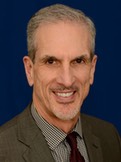
Sesson Description
"Whether in a classroom, team room, meeting room, or boardroom, we all have a desire to maximize the potential for out communications to be memorable, meaningful, engaging, and inspiring. This fun, highly-interactive, and multidimensional learning experience models the elements that make up compelling communication. Learn how to engage listeners adn motivate them into action, reflection, and postive development when you speak to any size group!"
Mark's Notes
I actually sat with David on the plane from Phillidelphia to Austin! This was the most amazing presentation of the conference.
The session focused on the use of dynamic movement around the room, specific types of images on the slide show, and the use of music to set the tone of a session. David's interactive style was captivating and engaged everyone in the room.
I connected with David's entire team from Mowhawk Valley as we adventured into the city for dinner and to watch the famous bats come out from underneath the Congress Avenue Bridge.
David would be an excellent speaker/trainer to bring to KVCC.

